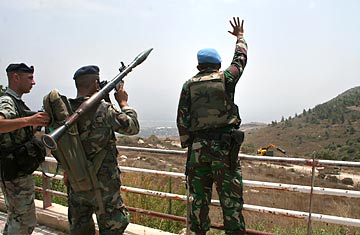
A UNIFIL peacekeeper waves as a Lebanese soldier carries a rocket-propelled grenade in front of Israeli troops patrolling the border fence in the southern village of Adaisseh, Lebanon, on Aug. 3, 2010
What was first billed as a mere border skirmish took on a darker cast late Tuesday when Israel revealed that its sole fatality along the Lebanon blue line was its most senior officer on the scene. "It was a planned ambush by a sniper unit," Major General Gadi Eisenkot, chief of Israel's northern command, told reporters at an afternoon briefing. "This was a provocation by the Lebanese army."
For a regional military superpower, Israel has demonstrated a considerable talent for casting itself as the victim. When its navy commandos killed nine activists on a boat looking to break the sea blockade on Gaza two months back, Israelis blamed the dead civilians for setting upon the underprepared boarders with cudgels, kitchen knives and broken handrails. But the death by gunshot of Lieutenant Colonel Dov Harari appears to support the Israeli version of events that brought on the most serious clash on the Lebanon border since a 34-day war erupted four years ago out of a more serious skirmish initiated by Hizballah, the guerrilla army some suspect was behind Tuesday's episode.
The latest clash came after Israeli troops set out to trim bushes and trees along a fence that in some places marks the internationally accepted border between Israel and Lebanon, and in other places runs a few hundred yards inside Israeli territory that its army judged easier to defend. Israel said the mission had been cleared in advance by the U.N. peacekeepers posted in the area, who passed the word to the Lebanese army. It was routine work, carried out by reservists. (The Lebanese army claims that the Israelis crossed the border and that they fired warning shots that prompted the Israelis' artillery fire, setting off the confrontation.)
"Officers oversaw the operation from a permanent position," said Eisenkot. "Sniper fire was directed at the officers, and two of them were wounded as a result." The battalion commander was killed, while the captain who headed the company suffered serious wounds but was expected to survive.
Israeli government sources told TIME that the soldiers reported hearing the distinctive report of a sniper rifle from a house on the Lebanese side, followed by the rattle of an AK-47 rifle. Israel responded with 155-mm artillery, tank fire, rifles and salvos from a helicopter gunship. Three Lebanese soldiers were killed as well as a journalist.
In the immediate aftermath, both countries issued statements holding the other government responsible, but all eyes were on Hizballah, the Shi'ite party and militia backed by Iran and Syria. It was Hizballah that provoked the 2006 war by attacking Israeli positions along the same twisting border. "Hizballah is and will be the only effective military force in Lebanon and the only party responsible for strategic decisions in Lebanon," says Giora Eiland, a retired Israeli major general still prominent in the defense establishment. "Now, was this event only some kind of difference about the border or something more deliberate than that? Well, I would guess that it's more deliberate than that. And due to the fact that Hizballah is the only significant military force north of border, I would not hesitate to think Hizballah persuaded a Lebanese commander to do something."
Another Israeli official who spoke with TIME pointed out that Shi'ites — the community that has elected Hizballah to a major role in Lebanon's government — account for a growing share of the officers and enlisted men of Lebanon's national army. Eiland suggests that, in fact, there is close cooperation between the national army and Hizballah.
It's not clear whether Tuesday's exchange was an isolated incident or the opening salvo of a new war. Predicting a summer of new fighting between Israel and Lebanon has been a favorite pastime in the Middle East, especially in recent days. After the leader of Hizballah announced that an international court would likely indict members of his group for the 2005 assassination of two-time Prime Minister Rafiq Hariri in Beirut, the received wisdom became that Hizballah would stir up a distraction on the border — one that reminded the Arab world of Hizballah's relative success against the Israeli war machine in the 2006 war. "The timing is not surprising," Eiland says.
But Hizballah's leader, Sheik Hassan Nasrallah, said in speech on Tuesday night that he had ordered his men to restrain themselves from retaliating against what he said was an Israeli provocation designed to blame his movement for a new war. He saluted the Lebanese army for confronting the Israelis and said that next time Israel crossed the border, Hizballah's men would be under orders to fight them off.
The U.N. has urged both sides to avoid confrontation. Israel filed a complaint to the U.N. Security Council while warning Lebanon about "this highly grave incident." Lebanese President Michel Suleiman, meanwhile, urged his country's uniformed forces to "confront any Israeli aggression whatever the sacrifices." And Syrian President Bashar Assad, who warned on Sunday that "the possibility of war is increasing," vowed Tuesday that Syria will "stand by its sister Lebanon."
— With reporting by Aaron J. Klein / Tel Aviv
